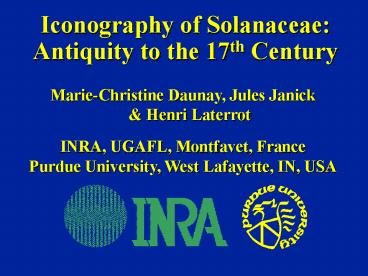Iconography of Solanaceae: Antiquity to the 17th Century - PowerPoint PPT Presentation
1 / 75
Title: Iconography of Solanaceae: Antiquity to the 17th Century
1
Iconography of SolanaceaeAntiquity to the 17th
Century
Marie-Christine Daunay, Jules Janick Henri
Laterrot INRA, UGAFL, Montfavet, France Purdue
University, West Lafayette, IN, USA
2
Solanaceae Species
- OLD WORLD
- Mandrake Mandragora spp.
- Henbane Hyoscyamus spp.
- Belladonna Atropa belladonna
- Nightshades Solanum nigrum aff.
- Eggplant Solanum melongena
3
Solanaceae Species
- NEW WORLD OLD WORLD
- Alkekengi (OW) Physalis alkekengi
- Husk tomato (NW) Physalis spp.
- Downy thornapple (OW) Datura metel
- Downy thornapple (NW) Datura innoxia
- Jimsonweed (NW) Datura stramonium
4
Solanaceae Species
- NEW WORLD
- Tomato Solanum lycopersicum Lycopersicon
esculentum - Capsicum pepper Capsicum spp.
- Potato Solanum tuberosum
- Tobacco Nicotiana spp.
5
Two main sources of images
paintings
6
Sources
- Pre-Columbian Documents
- New World Documents
- Medieval Manuscripts
- Renaissance Herbals
7
Otto Brunfels 14641534
Leonhart Fuchs15011566
George Oellinger14871557
8
Pier Andrea Mattioli 15011577
Jacques Dalechamp15131588
Rembert Dodoens15171585
9
Ulisse Aldrovandi15221605
Mathias de LObel 15381616
Charles de LEcluse 15261609
10
John Gerard 1545-1612
Gaspar Bauhin15601624
Besler 15611619
11
Other herbalists used
Castor Durante, 15201590
Adam Lonicer, 15281586
Jacobi Zanoni, 16151682
Zuingeri, 16581724
John Parkinson15671629
12
Mandrake Harvesting fruits from ivory casket of
Tutankhamun 1327 BCE
13
Dioscorides ca. 512, Aniciae Julianae Codex
Dioscorides receiving mandrake from the nymph
Epinoia (Discovery) for Krateuas to paint.
14
Dioscorides ca. 512, Aniciae Julianae
Codex Krateuas painting mandrake
15
Dioscorides ca. 512
10th C
16
Hertensis 9th C
Pflanzenbuch 1500
Tacuinum Sanitatis15th C
17
Fuchs 1543
Lobel 1576
18
Aldrovandi 2nd half 16th C
Besler 1613
19
Henbane(black, yellow, white)Dioscorides8th C
20
Fuchs 1543
21
Lobel 1576 (black, white, yellow henbane)
22
Belladonna
Horae ad usum romanum15031508
23
Fuchs 1543
Aldrovandi 2nd half 16th C
24
Lobel 1576
25
Nightshades(Nachtschatten)Dioscorides512
26
Manfredus de Monte Imperiali, de herbis 13301340
Schöffer, Herbarius 1485
Horae ad usum romanum 15031508
27
Fuchs 1543
28
Manfredus de Monte Imperiali, de herbis 13301340
Livre des simples medecines Mid 15th C
29
Eggplant
18th C
Sancai Tuhui mid 17th C
Hu Sihui 1330
Zhiwu Mingshi Tukao 1858
30
Manfredus de Monte Imperiali, de herbis 13301340
31
Tacuinum sanitatis
15th C
13851390
32
Tacuinum sanitatis 13901400
Manuel des vertus vegetaux, animaux 1480
33
Villa Farnesina ceiling festoons, RomaUdine
15151518
34
Fuchs 1543
Aldrovandi 2nd half 16th C
35
Besler 1613
36
Dalechamp 1653
37
Archimboldo Autumn 1573
38
Pisa Cathedral 1601
39
Alkekengi
- Dioscorides ca. 512
Dioscorides 7th C
40
Manfredus de Monte Imperiali, de herbis 13301340
Bartholomaeus mini, tractatus de herbis 2nd half
of 15th C
Horae ad usum romanum15031508
41
Fuchs 1543
Codex bellunensis 15th C
42
Husk TomatoAldrovandi 16th C
43
Besler 1613
44
Hernandez 1651
45
Downy Thornapple Old WorldDatura metel
Aldrovandi 2nd half 16th C
Ollinger 1553
46
Still Leben mit Kurbissen ca. 1650
47
Besler 1613
48
Downy Thornapple Datura inoxiaFuchs 1543
49
Jimsonweed Datura stramonium Florentine Codex
15401585
50
Aldrovandi 2nd half 16th C
Dodoens 1608
51
Besler 1613
52
TomatoColumbia 900915 CEMcMeekin, 1992
53
Fuchs unpubl. 15491556
Dodens 1553
Gessner unpubl. 1553
54
Ollinger 1553
55
Matthioli 1586
Dodoens 1574
56
Pisa Cathedral 1601
57
Besler 1613
58
Capsicum Pepper
Peru 400500 CE
Mexico 5001500
59
Mexico, Codex Mendoza 1542
60
Codex Amphibiorum 1540
61
Fuchs 1543
Capsicum chinense?
Capsicum annuum
62
Ollinger 1553
Capsicum chinense?
Capsicum annuum
63
Aldrovandi 16th century
Lobel 1576
Capsicum pubescens?
Capsicum annuum
64
Pisa Cathedral 1601
Besler 1613
Capsicum baccatum?
Capsicum annuum
65
Potato
Proto-Chimu period pre-columbian, 200 CE
Chimu period pre-columbian, 900
66
Filipe Guaman Poma de Ayala 1615, Peru
67
Plantin Collection 16th C
Gerarde 1597
68
Clusius 1601
69
Besler 1613
70
Tobacco
Florentine Codex 15401585, Mexico
Badianus manuscript, 1552
71
Fuchs unpubl. 15421565
72
Lobel 1576
73
Besler 1613
74
Conclusions 1. Iconography and related texts
are a rich source of information on genetic
diversity, nomenclature, and uses. 2. New World
Solanaceae were eagerly acquired and described by
Renaissance herbalists, quickly adopted in
Southern Europe, and became major crops world
wide. 3. A paradox exists in that the harmless
species (eggplant, tomato, and potato) were
tainted with the malevolent properties of some
Old World Solanaceae (mandrake, henbane, and
belladonna) whereas tobacco, which poses a
world-wide health hazard, was considered a
panacea.
75
Acknowledgements Libraries Missouri Botanical
Garden, Saint Louis Botanical Garden,
Berlin Natural History Museum, London BNF,
Museum National dHistoire Naturelle, Paris
Musée Ceccano Musée Requien,
Avignon Scientists G. van der Weerden, A.
Palloix, S. Knapp, L. Bohs, B. Schultz, H.S.
Paris Technical Help A. Whipkey, E.
Jullian

